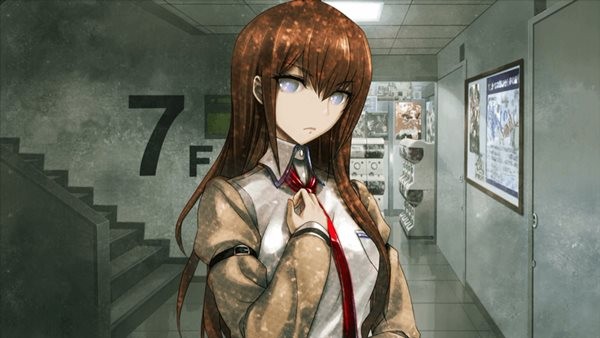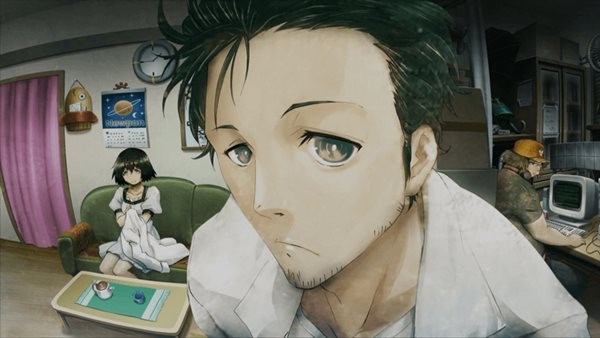Also On: PS3, PC
Publisher: PQube
Developer: MAGES./5pb./Nitroplus
Medium: Digital/Disc
Players: 1
Online: No
ESRB: M
Does a game need to have likeable characters in order to be enjoyable?
That’s actually not a rhetorical question, by the way — or at least not entirely. I ask it because your answer will most likely determine how much you enjoy Steins;Gate.
This is because — and there’s no way to put it nicely — the game’s main character is a colossal douchebag. Obnoxious, rude, delusional, angry, possibly homophobic, definitely transphobic…basically, just think of the most thoroughly misanthropic person imaginable, and you have some idea of what Rintaro Okabe (or Okarin, or Kyoma Hooin, or whatever name he’s going by) is like. Considering that Rintaro is also the narrator, committing to Steins;Gate also means committing to spending every second of the game with a profoundly unlikeable person. Sure, the supporting cast isn’t nearly as bad, but that hardly matters when you’re stuck without someone so detestable the whole time. In other words, if you answered a resounding “Yes” to this review’s first sentence, chances are good you’re not going to find Steins;Gate to be particularly fun.
If, however, you’re able to overlook obnoxious characters in favour of most other aspects of the game being worthwhile, then you’ll most likely have the opposite reaction. This is because — and I say this as someone who probably leans more towards the opposing viewpoint — Steins;Gate does a lot of stuff very well. Most obviously: it actually tries to tell a story. You’d think this would be the baseline thing for any visual novel, but having played both Xblaze games I know that’s not always the case. Some visual novels take narrative shortcuts, and expect that your knowledge of the source material and broader universe will fill in the gaps. Steins;Gate doesn’t do that; you don’t need to know the game’s anime backstory to follow along (which is a good thing, because this is my first exposure to the franchise). Instead, it lays out the characters and the setting, and allows everything to just happen in front of you. It’s kind of crazy that a game so reliant on narrative could be praised for this, but there you go.
Likewise, it doesn’t treat the players like they’re idiots. I mean, it kind of does, but only because Rintaro treats everyone like they’re idiots. Taking a step back and looking at it from a broader perspective, though, it’s plain that Steins;Gate has no problem giving players lots and lots of dense information, and trusting that they’ll be able to remember it, follow along, and see how Point A leads to Point B. It’s kind of refreshing to see a game that places so much trust in its readers/players — and it’s all the more impressive that this game in particular does that, considering how heavy it goes into hard sci-fi territory. This all goes back to that previous point, though: Steins;Gate is able to tell a complex story because it actually tries to tell the whole story, rather than just skipping along from plot point to plot point and hoping players know enough backstory they’ll be able to make sense of it in their heads.
As you can imagine, all of this takes some time. Even though Steins;Gate has some interactive components that allow you to impact the story’s outcome, it’s important to know that it’s possible to go for hours at a stretch here and never have the opportunity to do anything more than press X to advance the text. Obviously, you shouldn’t go into any visual novel without the expectation there’ll be reading involved, but that seems to go double here.
Whether you want to make that commitment, then, all goes back to that first question: do you want to commit hours and hours of your time reading a narrative driven and told by a massive jerk? It’s entirely acceptable to say no — but remember that the trade-off for accepting the obnoxiousness is that you’ll get one heck of a story out of it in return.



